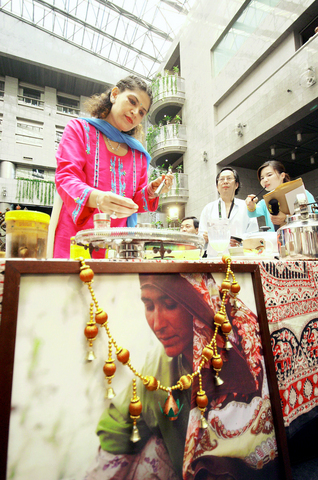Displaying a range of wares from Taiwan Paochung tea to English black tea, the Taipei Tea Culture Expo will commence at the Taipei Arena next Wednesday, drawing tea connoisseurs and industry professionals from around the world.
The exhibition, organized by the Taipei City Department of Cultural Affairs and running from Wednesday through Saturday, will include representatives from six prominent teahouses run by connoisseurs in Japan, South Korea, the UK, India and Tibet, who will give demonstrations on how their countries consume tea.
"Tea is an important part of local culture and the daily lives of our people. This expo is a rare opportunity for participants to appreciate Taiwanese tea culture, as well as understand more about tea culture from around the world," Deputy Commissioner of the department Lee Bin (

PHOTO: CHENG HSUEH-YUNG, TAIPEI TIMES
Making "Masala Tea" from northern India at the press conference, India connoisseur Girija Shah put "Masala" -- a mix of powdered black pepper, dried ginger, cloves, cinnamon and nutmeg -- into boiling water with tea leaves, milk and sugar.
"This is good for winter, and good for curing the flu," she said, adding that the Indians often drank the tea during gatherings of friends and family.
The exhibition will also include Japanese tea masters from Ur-asenke, one of the three main schools that teach the Japanese tea ceremony, which encompasses spiritual and religious practices.
According to Takako Onuma, manager of the Urasenke Taipei Association, all the tea sets, tea and tea snacks that will be on display are all brought directly from Japan.
"The gestures in the Japanese tea ceremony are a representation of the host's deepest appreciation to the guests. The tea ceremony is very traditional and has a long, unbroken history in Japan," she said.
Eight exhibition halls will be open to the public during the exhibition. Tickets for the performances vary from NT$300 (US$10) to NT$2,500, and are available through ERA ticketing outlets. Information about the exhibition can be found at http://tea.culture.gov.tw.

Global bodies should stop excluding Taiwan for political reasons, President William Lai (賴清德) told Pope Francis in a letter, adding that he agrees war has no winners. The Vatican is one of only 12 countries to retain formal diplomatic ties with Taiwan, and Taipei has watched with concern efforts by Beijing and the Holy See to improve ties. In October, the Vatican and China extended an accord on the appointment of Catholic bishops in China for four years, pointing to a new level of trust between the two parties. Lai, writing to the pope in response to the pontiff’s message on Jan. 1’s

A Vietnamese migrant worker on Thursday won the NT$12 million (US$383,590) jackpot on a scratch-off lottery ticket she bought from a lottery shop in Changhua County’s Puyan Township (埔鹽), Taiwan Lottery Co said yesterday. The lottery winner, who is in her 30s and married, said she would continue to work in Taiwan and send her winnings to her family in Vietnam to improve their life. More Taiwanese and migrant workers have flocked to the lottery shop on Sec 2 of Jhangshuei Road (彰水路) to share in the luck. The shop owner, surnamed Chen (陳), said that his shop has been open for just

TAKE BREAKS: A woman developed cystitis by refusing to get up to use the bathroom while playing mahjong for fear of disturbing her winning streak, a doctor said People should stand up and move around often while traveling or playing mahjong during the Lunar New Year holiday, as prolonged sitting can lead to cystitis or hemorrhoids, doctors said. Yuan’s General Hospital urologist Lee Tsung-hsi (李宗熹) said that he treated a 63-year-old woman surnamed Chao (趙) who had been sitting motionless and holding off going to the bathroom, increasing her risk of bladder infection. Chao would drink beverages and not urinate for several hours while playing mahjong with friends and family, especially when she was on a winning streak, afraid that using the bathroom would ruin her luck, he said. She had

MUST REMAIN FREE: A Chinese takeover of Taiwan would lead to a global conflict, and if the nation blows up, the world’s factories would fall in a week, a minister said Taiwan is like Prague in 1938 facing Adolf Hitler; only if Taiwan remains free and democratic would the world be safe, Deputy Minister of Foreign Affairs Francois Wu (吳志中) said in an interview with Italian newspaper Corriere della Sera. The ministry on Saturday said Corriere della Sera is one of Italy’s oldest and most read newspapers, frequently covers European economic and political issues, and that Wu agreed to an interview with the paper’s senior political analyst Massimo Franco in Taipei on Jan. 3. The interview was published on Jan. 26 with the title “Taiwan like Prague in 1938 with Hitler,” the ministry